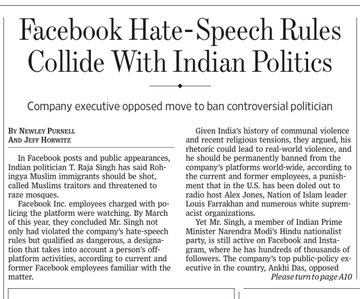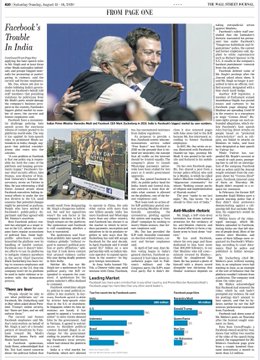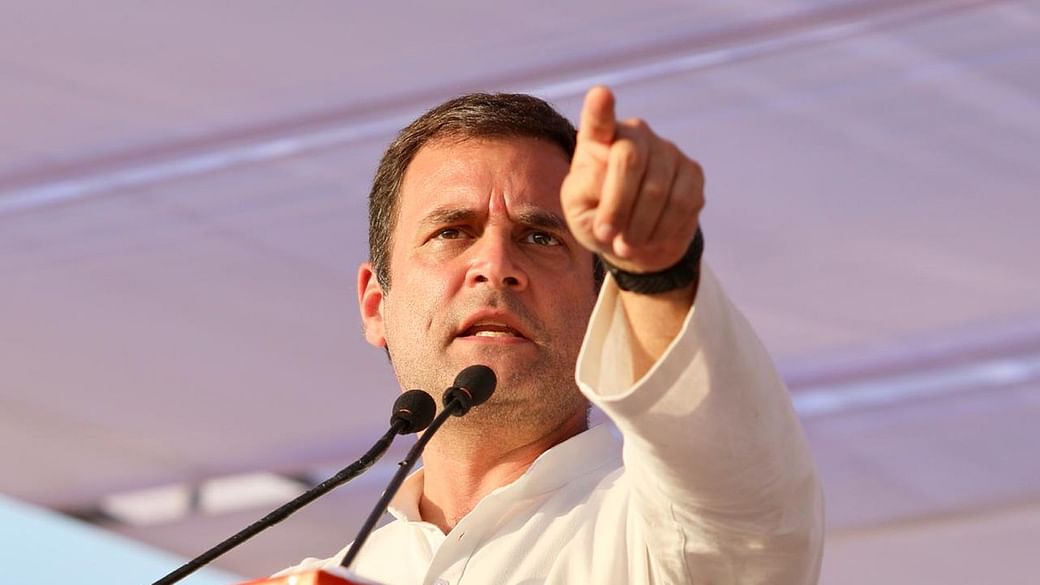linked with the BJP despite the fact that they were “flagged internally for promoting or participating in violence.”"BJP and RSS control Facebook and Whatsapp in India. They spread fake news and hatred through it and use it to influence the electorate. Finally, the American media has come out with the truth about Facebook," Gandhi tweeted.
A day after The Wall Street Journal (WSJ) reported that Facebook opposed applying its hate-speech rules to entities linked with the BJP, Congress leader Rahul Gandhi Sunday alleged that the saffron party controls the social networking site, along with WhatsApp, and uses it to spread fake news in order to influence the electorate.
“BJP and RSS control Facebook and Whatsapp in India. They spread fake news and hatred through it and use it to influence the electorate. Finally, the American media has come out with the truth about Facebook,” Gandhi tweeted.


On Saturday, the WSJ reported that citing business imperatives, Facebook’s top public policy executive in India “opposed applying hate-speech rules” to at least four individuals and groups linked with the BJP despite the fact that they were “flagged internally for promoting or participating in violence.”
Facebook India’s Public Policy Director Ankhi Das told staff members that “punishing violations” by BJP politicians “would damage the company’s business prospects in the country, Facebook’s biggest global market by number of users,” WSJ had reported.
Referring to hate-speech — calling for violence against minorities — allegedly by Telangana BJP MLA T Raja Singh, the report had cited “current and former” Facebook employees as saying that Das’s intervention is part of a “broader pattern of favouritism” by the company towards the ruling party.
The WSJ report had stated that internal Facebook staff concluded that the MLA should be banned from the platform under a policy called “Dangerous Individuals and Organizations”. Facebook spokesman Andy Stone said Das had “raised concerns about the political fallout” but said her opposition “wasn’t the sole factor in the company’s decision to let Singh remain the platform.” According to the report, Facebook deleted some of Singh’s posts after a query from WSJ, and said that he was no longer allowed to have an official account.
When contacted by The Indian Express, Singh claimed he did not personally post any of the content mentioned in the report and that his page was taken down.
“Facebook did not communicate with us when they took down our official page in 2018. Now, many different supporters across the country have been making pages in my name. We cannot stop anyone. We do not have control,” Singh said. There are at least eight pages and profiles in Singh’s name.
The policy referred to by some Facebook India employees to flag Singh’s alleged posts is the “Dangerous Individuals and Organisations” policy. Under this, content that praises or supports activity such as “organized hate”, “mass murder”, “hate crimes”, or “terrorist attacks” is banned.
Incidentally, Facebook had labelled the communal riots in Northeast Delhi this February as a “hate crime” under this policy, sources told The Indian Express in the beginning of March. The process involved local flagging and a decision made with the global team, they said.
In March last year, Facebook was summoned to the IT Parliamentary Standing Committee led by Anurag Thakur who had accused the platforms (primarily Twitter) of anti-conservative bias.
































